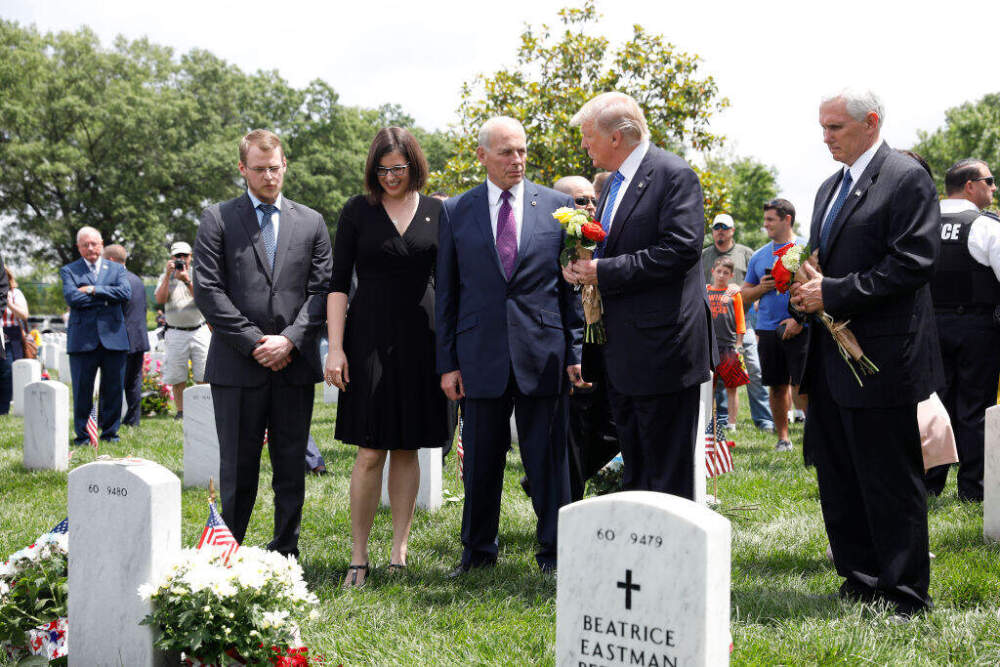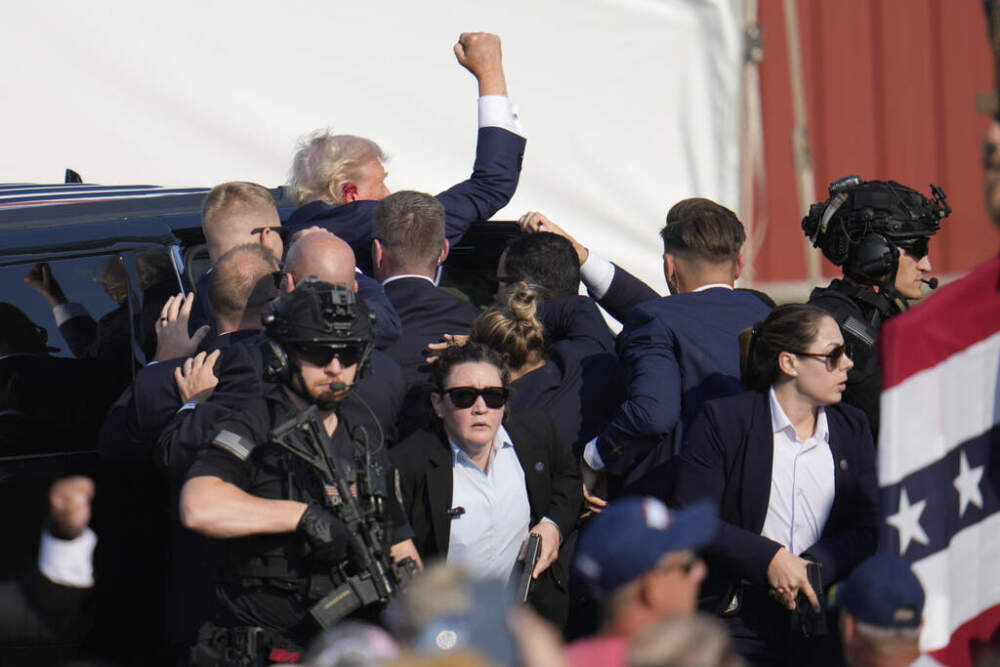Advertisement
Commentary
God didn't 'spare our president.' Trump was looking out for himself

At their June debate President Biden and former President Trump exchanged sharp words over whether the latter refused to visit the Aisne-Marne American Cemetery at Belleau Wood on Armistice Day in November 2018, because he believed our fallen soldiers and Marines there to be “losers” and “suckers.” Trump denied making the remark, which his then-chief of staff John Kelly later publicly attributed to the former president.
I wasn’t in France that day, but I vividly recall Memorial Day 2017. I went with my eldest son to Arlington National Cemetery to decorate graves in and around Section 60, where lay servicemembers killed in Afghanistan and Iraq. The president’s limousine had just departed when I saw General Kelly standing over the grave of his son, Robert Kelly. Lieutenant Kelly fell while leading Marines, by example and from the front, in Helmand Province in 2010.
I got to know General Kelly a bit while doing some pro bono legal work for a Marine, and later served as a senior counselor to him when he was the secretary of Homeland Security. I’d seen Kelly in Section 60 before. Like most Irish men of his generation, I suspect he only displays his grief in private. On Memorial Days past, I noticed Kelly gently comforting fellow Gold Star families and warmly greeting former colleagues, like a good leader. In 2017, however, the general seemed unusually upset as Trump’s motorcade drove towards Washington. I quietly asked Kelly what was wrong; he shook his head “no” and I left the subject alone.

Children are often more perceptive and empathetic than adults. In Matthew’s Gospel, Jesus challenges his followers that they shall not enter into the kingdom of heaven unless they “become as little children.” After the general shook his head “no” my then 5-year old son simply and wisely asked Kelly if he’d like to say a prayer.
Kelly replied slowly and with emotion, “You’d like to pray with me over my son’s grave?” A tall man at 6’3”, he got down to my little boy’s level. Holding hands, together they said a fervent Hail Mary.
Kelly later served as President Trump’s White House chief of staff. Soon after he left the administration, I caught up with the general. Kelly quietly mentioned to me his shock at derogatory statements the president made about our war dead, including the "losers" and "suckers" remark in France, and when he asked "I don't get it. What was in it for them?” at Arlington. I recalled the poignant moment at his son’s graveside a year and a half before. The general confirmed that was where Trump asked a bereaved father that awful question.
Surviving incoming fire is no sign of predestination or moral superiority. As we know, it’s usually the best among us who are taken too soon.
The experience of being wounded in an assassination attempt at a campaign rally in Butler, Pennsylvania might well have broadened and softened Trump’s worldview. We’ve been told as much this week as Republicans gather in Milwaukee to formally nominate the former president. However moments after the shooting, the former president ignored his dead and seriously wounded supporters laying nearby, even as bystanders motioned frantically for help, to express concern for retrieving his shoes.
Twice Trump stopped his Secret Service detail to mug for the crowd and photographers. This wasn’t brave or tough, it was foolish and selfish. The former president endangered himself, his agents and worse, the women and children standing behind him, had there been a second gunman, as should prudently have been assumed.
Many senior leaders enjoy the status validation of a protective detail. By contrast, General Kelly enlisted in the Marine Corps as a private. He once told me that he enjoyed security details as a four-star combatant commander, cabinet secretary and White House chief of staff only because they reminded him of being a Marine sergeant leading an infantry squad. He explained that it gave him a small group of young subordinates to know personally and to mentor. It’s impossible to imagine the general, or anyone like him, endangering his detail, and civilians, for a photo opportunity.
Advertisement

Hubristic campaign rhetoric that God spared our former president — while implicitly not sparing Corey Comperatore, the former fire chief who was killed while shielding his family — rings false to many veterans. Surviving incoming fire is no sign of predestination or moral superiority. As we know, it’s usually the best among us who are taken too soon.
A person does not need to serve in the military to be a great president. Thomas Jefferson was a fine commander-in-chief. Woodrow Wilson and Franklin Roosevelt triumphed in world wars without experience in uniform. Meanwhile six presidents with honorable combat records shared degrees of executive responsibility for our ultimate defeat in Vietnam.
Yet most presidents observe that the hardest part of serving as commander in chief is deciding whether to send Americans into harm’s way, knowing that some youngsters precious to God and their families will not return. We Americans reasonably assumed that no president — Democrat or Republican, veteran or not — ever made that tough decision with anything other than lumps in their throats and hearts full of respect, care and even love for troops entrusted to their command.
Those of us alive in 1981 recall former President Ronald Reagan’s immediate and sincere concern for his staffer James Brady, Secret Service agent Timothy McCarthy and D.C. Police Office Thomas Delahanty, each wounded in the assassination attempt on that president.
This is why former President Trump’s remarks about those lost in past wars, and his poor behavior under fire earlier this month, remain shocking to the conscience.
